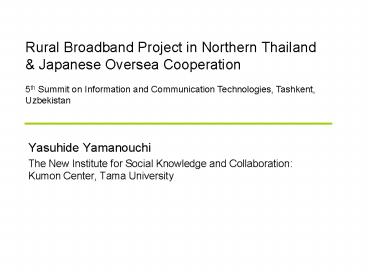Rural Broadband Project in Northern Thailand - PowerPoint PPT Presentation
1 / 19
Title:
Rural Broadband Project in Northern Thailand
Description:
The 'local loop', or 'last mile' is one of the formidable problem for ... agricultural area in northern part of the country, bordering to Myanma and Laos. ... – PowerPoint PPT presentation
Number of Views:54
Avg rating:3.0/5.0
Title: Rural Broadband Project in Northern Thailand
1
Rural Broadband Project in Northern Thailand
Japanese Oversea Cooperation
5th Summit on Information and Communication
Technologies, Tashkent, Uzbekistan
- Yasuhide Yamanouchi
- The New Institute for Social Knowledge and
Collaboration Kumon Center, Tama University
2
- The local loop, or last mile is one of the
formidable problem for information infrastructure
construction, not only for PSTN but for Internet.
PSTN Public Switched Telephone Network /
traditional telephone system- Local loop
usually means from the conduit of a home to the
nearest telegraph pole. By definition, the
numbers of local loop is equal to that of
subscribers, and quite costly for the
telecommunication service providers operation.
3
- Recent technological progresses offer
alternatives to the PSTNs traditional copper
twisted wires. Namely - optical fiber for
local loop FTTH - co-axile and fiber hybrid
- ADSL twisted copper for high speed data
transmission - mobile telephone, 1st, 2nd, and
3rd generations, PHS - mobile phone for
Internet, CDMA, HSDA - wireless local access,
FWA, - Wireless LAN, 802.11b-g-e WiFi,
802.16 WiMAX - PLC Power Line
Communications - Satellite downlink, like IP
Star - UWB Ultra Wide Band and so
forth, These technology offer tremendous
opportunities for the introduction of National
Information Infrastructure.
4
- Thailands governmental research institute,
NECTEC (National Electronics and Computer
Technology Center, an affiliate of NSTDA
(National Science and Technology Development
Agency )) has been working to develop and to
introduce RWBA (Rural Wireless Broadband Access)
in remote mountainous and agricultural area in
northern part of the country, bordering to Myanma
and Laos.- Japanese government has supported
this project financially and technologically.
The framework was by Official Development Aid
through JETRO (Japanese External Trade
Organization) from 2004 to 05, shifting to JICA
(Japanese International Cooperation Agency) from
07.
5
(No Transcript)
6
(No Transcript)
7
(No Transcript)
8
(No Transcript)
9
(No Transcript)
10
- New Institute at Tama University exchanged MoUs
with Thai National Mae Fah Luang University
(MFLU) located in the outskirts of Chiang Rai in
Northern Thailand. - The configuration for demonstration experiment
is to simulate MFLU as the center of a village,
and the elementary school ,2.3 km from the MFLU
as houses locating at the fringe of that village.
- In Thai rural areas, usually optical fiber or
metallic cable are installed in public buildings
such as village administration building or
schools located at the center of village.
Yuji Hatakeyama (NTTDoCoMo), Kenichi Takeshita
(NTTBP) , Hirofumi Ichikawa (NTTAT), Yukio Yokoi
(NaganoJRC), Hideya Otani (BeMap), Akiyuki Goto
(NECTEC), Thongchai Yooyativong (Thailand Mae Fah
Luang Univ.), Mitsuji Matsumoto (Thailand GITS,
Waseda Univ), A Proposal to Implement Mobile
Wireless IP Telephony to the Mekong River Region,
2006.
11
- - Average population of the village is around
600 and 80 locate in remote areas. Lots of them
are commercially in-viable neither by fixed
wire nor mobile. - There are approximately 70,000 villages in
Thailand, and their average land area is
estimated to be 7.7 square kilometers. - Since the operation of 2.3 km-entrance circuit
was verified, most of the villages can be covered
by the combinations of WiMAX and WiFi. - The experiment through WIPAS (NTTs technology
of WFA or WLL Wireless Local Loop) indicated the
enough capacity of the coverage through this
model technologically.
12
(No Transcript)
13
(No Transcript)
14
- Lessons learned (1)
- VoIP (Voice over IP) over Wireless is also proved
inside the LAN, i.e., it was not connected to
PSTN operators line. - Two ways of VoIP services on this scheme are
conceivable (i) allocation of dedicated number
for IP telephony (for example, 050 in Japan) by
telecom authority and additional introduction of
the gatewy (centrex), or, (ii) Skype out.
15
- Lessons learned (2)
- Local business promotion through ICT is a
necessary part (or rather, main objects) for the
sustainable operation of this model. - Thailand government promotes one village one
product (OTOP) project. Checking market prices
of agricultural products, communications with
traders in urban area, taking consultations from
specialists, e-learning for qualifying
examination like accountant, etc. are examples. - In other words, economic development through
global market economy might be the key, i.e.,
Grameen phone model. - Sullivan, Nicholas, You can hear me now How
microloans and cell phones are connecting the
worlds poor to the global economy, 2007.
16
Prahalad, The Fortune at the Bottom of the
Pyramid, 2005, P.9.
17
- Lessons learned (3)
- Financial scheme is therefore crucial. Risk
should be properly allocated among governmental
assistance (ODA), commercial banks, and private
industry.
Report of Asian PPP Promotion Study Group,
Ministry of Economics, Trade and Industry, 2005.
18
- Lessons learned (4) Bottle-neck specification
should be useful.
(b) domestic backbones extending cities and
regions enough coverage ?
(a) connection to international backbone enough
bandwidth for nation-wide demand ?
(c) access loop population density and
appropriate technology
19
- Lessons learned (5) still problems surmount
- How we could include these model into ODA
framework - - issue finding
- - G to G conversations. PPP platforms,
etc - - F/S
- - financial framework and SPC
- (2) Coordination with telecom operators































